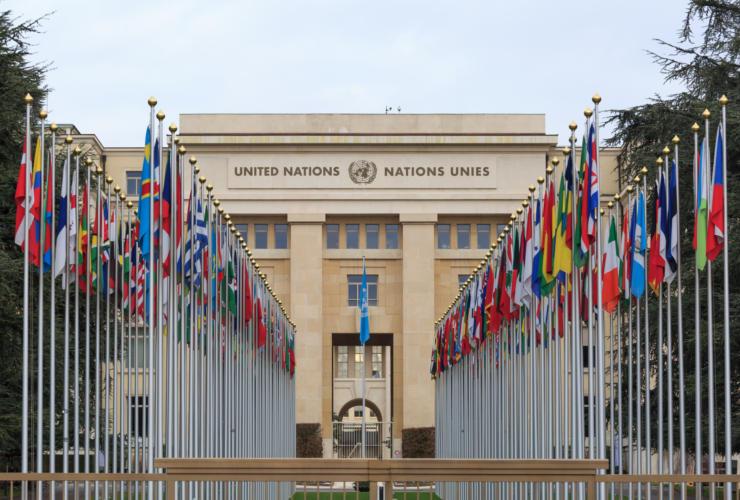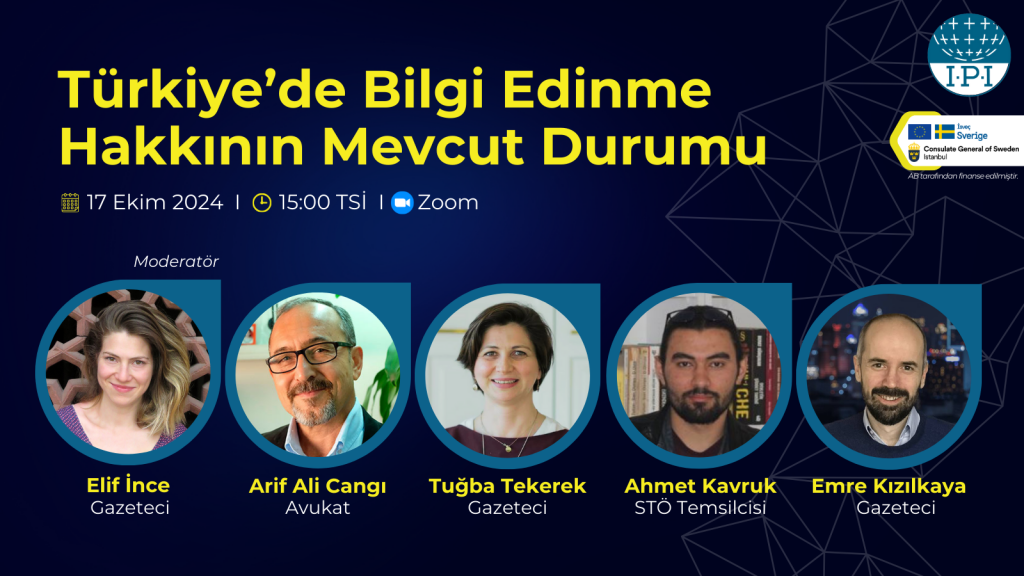The International Press Institute (IPI), a global network of editors, media executives and journalists, joins the international press freedom and free expression groups in a submission to the Universal Period Review (UPR) on Turkey.
Turkey’s human rights record will come under review by the UN Human Rights Council during the UPR mechanism in January 2020. Ahead of the review, IPI and other press freedom organizations ARTICLE 19, P24, PEN International, English PEN, Reporters Without Borders (RSF), Freemuse, European Centre for Press and Media Freedom (ECPMF), IFEX and Norwegian PEN have made a submission to the UPR.
Read the submission in full
More than three years since Turkey’s 2016 failed coup and one year after its state of emergency was lifted, the government continues its relentless and pervasive crackdown on civic space, media freedom and dissenting voices.
Some key recommendations of the report are to urge Turkey to restore the rule of law and impendence of the judiciary, to release all jailed journalists and to drop the hundreds of baseless charges against journalists, artists, civil society actors and academics.
International organizations’ representatives highlighted the importance of the joint submission:
“This report charts the extraordinarily rapid decline in the rule of law and freedom of expression in Turkey over the last four years. The Turkish authorities have dismantled the independence of the judiciary and more journalists have been jailed than anywhere else in the world,” said Sarah Clarke, Head of Europe and Central Asia of Article 19. “We urge UN member states to take much stronger action in holding Turkey to account for these violations.”
“The Turkish media is pinning its hopes on international mechanisms and the United Nations Human Rights Council to end its persecution,” IPI Director of Advocacy Ravi R. Prasad said. “This report not only highlights the precarious situation in Turkey but also makes suggestions to remedy the situation.”
“Freedom of artistic expression deteriorated rapidly in Turkey as we witness at least 16 artists being prosecuted on charges related to anti-terrorism since 2018,” said Dr. Srirak Plipat, Executive Director of Freemuse. “As a priority, the Turkey authorities should unconditionally release of these artists, journalists and other civil society actors to show international community that they mean business in restoring the right to freedom of expression.”
‘This is a key time to highlight the breakdown of the rule of law in Turkey over the past 5 years’, said Norsk PEN’s President Kjersti Løken Stavrum, ‘and to outline the devastating changes that were wreaked in the legal, media and academic arenas, indeed on civil society at large by many damaging decrees issued under the state of emergency. Turkey must fully restore the rule of law as well as restoring and protecting both media freedom and citizens’ rights to freedom of expression.’
During its last review by the UN in 2015, Turkey accepted 19 recommendations to improve freedom of expression, but human rights have since rapidly deteriorated with thousands of journalists, academics, artists and members of civil society facing ‘trumped-up’ politically-motivated charges of ‘terrorism’ and ‘attempting to overthrow the constitution’.
The partners of the joint submission highlight five key areas of concern and propose concrete recommendations that States must direct to Turkey during the upcoming Universal Periodic Review in January 2020, to ensure the right to freedom of expression in the country. These five keys areas are summarized as follows:
1.Erosion of rule of law leading to mass persecution of journalists
Turkey’s judicial independence has been massively damaged due to increasing governmental pressure on judges and judicial organs which creates a stark contravention of international standards. This assault on judicial independence eroded the rule of law, with judges in fear of reprisals if they fail to rule in favour of the government in politically motivated trials. It has also led to hundreds of arbitrary arrests, detentions, and unfair trials of journalists and civil society actors.
2.The absence of domestic remedy
Following the government’s dismissal of 130,000 civil servants and public officials after the failed coup, there has been no effective remedy for redress. While the government established an Inquiry Commission to review appeals in May 2017, of the 126,000 applications made only 5,250 have led to a reinstatement (as of May 2019). IPI and partners believe that no effective remedy exists in Turkey to challenge politically motivated dismissals and closures of media outlets, contrary to Turkey’s obligations under international law.
3.Problematic defamation and counter-terrorism laws used to quash dissenting voices
Our report challenges a number of freedom of expression issues retained in the Turkish Penal Code, particularly those relating to ‘defamation’ and ‘insult’ against public officials or beliefs, levying penalties of at least one year in prison. Provisions criminalizing insult of the President are deeply concerning and are frequently misused to silence criticism of the President or government bodies, landing scores of journalists, artists, and academics with fines and prison sentences.
4.Pervasive crackdown on media freedom
Independent media has been all but wiped out in Turkey. Under the State of Emergency Decrees at least 170 media outlets including publishing houses, newspapers and magazines, news agencies, TV stations and radios were closed on charges of spreading “terrorist propaganda”. Turkey’s mass liquidation of media outlets without independent, timely judicial review are unacceptable under international law. For the last three years, Turkey has been the world’s most prolific jailor of journalists. There are currently at least 135 journalists and media workers in detention; at least 300 have been detained since the imposition of the state of emergency and hundreds more are on trial.
5.Mass blockings of websites and platforms
Access to thousands of websites and platforms have been banned in Turkey after the government triggered a state of emergency decree to authorize government removals and blockings of websites without judicial oversight, a severe violation of international standards. As of December 2018, more than 10 VPN services and at least 3,000 online articles were subject to judicial blocking orders. Wikipedia has been blocked since 2017 after it refused to remove content alleging the Turkish government supported militant groups in Syria. YouTube was temporarily banned in 2015 for the same reason.



